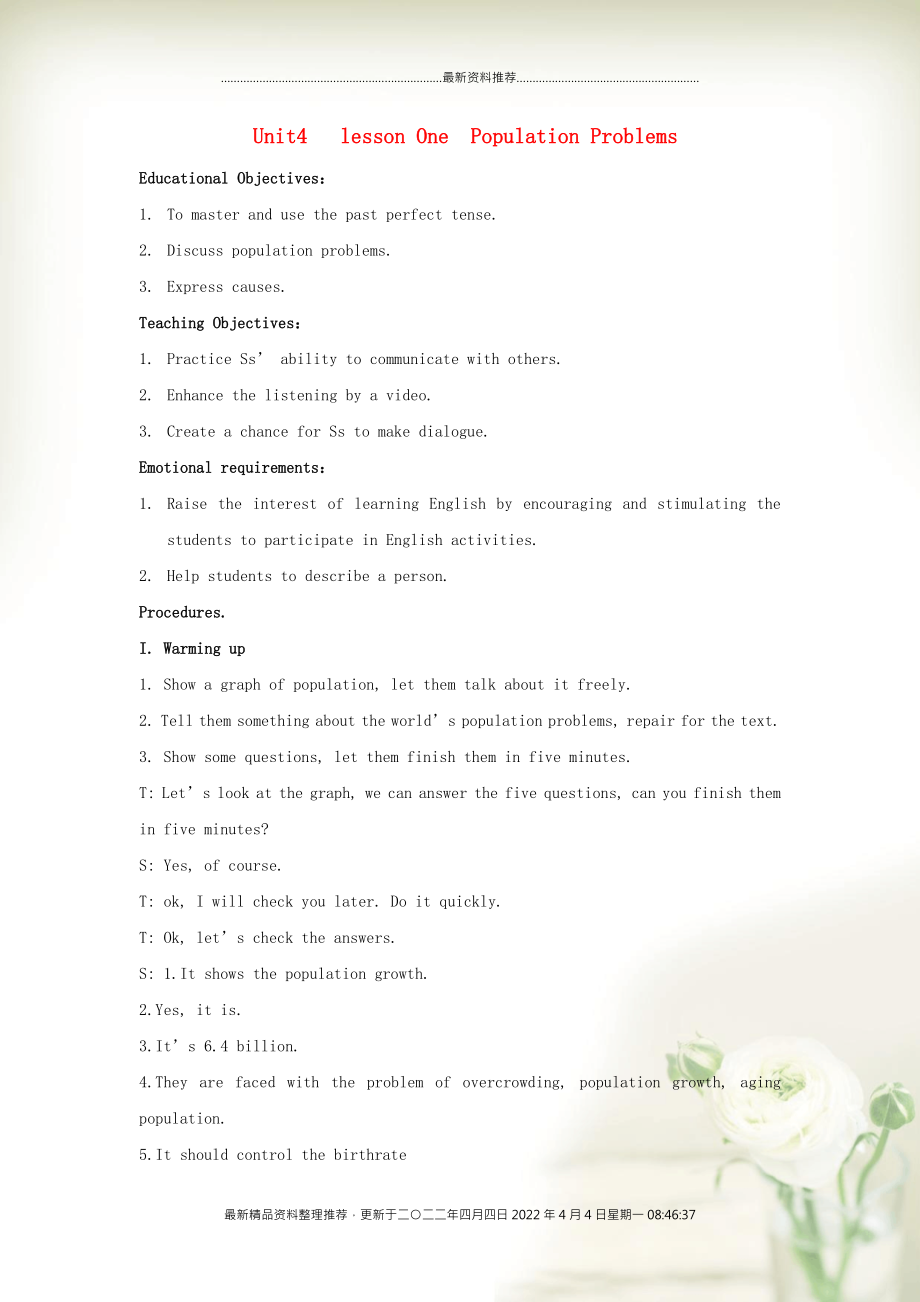《【金識(shí)源】八年級(jí)英語(yǔ)下冊(cè) Unit 4 Lesson 1 Population Problems教學(xué)設(shè)計(jì)1 上海新世紀(jì)版》由會(huì)員分享�,可在線(xiàn)閱讀,更多相關(guān)《【金識(shí)源】八年級(jí)英語(yǔ)下冊(cè) Unit 4 Lesson 1 Population Problems教學(xué)設(shè)計(jì)1 上海新世紀(jì)版(4頁(yè)珍藏版)》請(qǐng)?jiān)谘b配圖網(wǎng)上搜索��。
1�����、……………………………………………………………最新資料推薦…………………………………………………
Unit4 lesson One Population Problems
Educational Objectives:
1. To master and use the past perfect tense.
2. Discuss population problems.
3. Express causes.
Teaching Objectives:
1. Practice Ss’ ability to communicate with others.
2. Enha
2���、nce the listening by a video.
3. Create a chance for Ss to make dialogue.
Emotional requirements:
1. Raise the interest of learning English by encouraging and stimulating the students to participate in English activities.
2. Help students to describe a person.
Procedures.
I. Warming up
1. Sho
3�、w a graph of population, let them talk about it freely.
2. Tell them something about the world’s population problems, repair for the text.
3. Show some questions, let them finish them in five minutes.
T: Let’s look at the graph, we can answer the five questions, can you finish them in five minute
4、s?
S: Yes, of course.
T: ok, I will check you later. Do it quickly.
T: Ok, let’s check the answers.
S: 1.It shows the population growth.
2.Yes, it is.
3.It’s 6.4 billion.
4.They are faced with the problem of overcrowding, population growth, aging population.
5.It should control the birthrate
5�、
II. While-task activities
1. Teach the text.
i) T: We know the world population is growing very fast, do you know what’s the population of many countries? What’ s the population many years ago? let’s read the text, then fill in the blanks.
S: Read
Show the answers to them , let them check th
6�����、emselves.
ii) Do a pair work to ask and answer questions about the text.
2. Tell the past perfect tense.
1) Ask one of pair to read the sentences.
2) Answer the questions.
T: We can find the past perfect tense.
過(guò)去完成時(shí)的用法
一�����、構(gòu)成方法
由 had 加動(dòng)詞的過(guò)去分詞構(gòu)成�?! ?
二、用法說(shuō)明
■表示在過(guò)去某一時(shí)刻或某一動(dòng)作之前已經(jīng)完成了的動(dòng)作��,即“過(guò)去的過(guò)
7��、去”�。如:
She said she had never been to Paris. 她說(shuō)她從未去過(guò)巴黎。
When the police arrived, the thieves had run away. 警察到達(dá)時(shí)�,小偷們?cè)缇团芰恕?
By the time he was twelve, Edison had begun to make a living by himself. 到了十二歲那年����,愛(ài)迪生開(kāi)始自己謀生�。
注意:過(guò)去完成時(shí)是一種相對(duì)時(shí)態(tài),一定要有一個(gè)作參照的過(guò)去時(shí)間或過(guò)去動(dòng)作作比較����,否則����,就不能用過(guò)去完成時(shí)���。但下列3種情況雖然有是先后發(fā)生的兩個(gè)過(guò)去動(dòng)詞,卻同用一般過(guò)去時(shí)
8�、:
1. 先后發(fā)生的一系列動(dòng)作����,但并不強(qiáng)調(diào)先后時(shí),最后兩個(gè)動(dòng)詞用then�����,and�����,but 等連接�。如:
On Saturday afternoon, Mrs. Green went to the market, bought some bananas and visited her cousin. 星期下午��,格林夫人去了市場(chǎng)���,買(mǎi)了些香蕉�����,然后去看望了她的表姐。
2. 兩個(gè)動(dòng)作是緊接著發(fā)生的�����,可用一般過(guò)去時(shí)����。如:
When I heard the news, I was very excited. 我聽(tīng)到那個(gè)消息時(shí),非常高興�。
3. 敘述歷史事實(shí)�����,可用一般過(guò)去時(shí)�����。如:
Our tea
9�、cher told us that Columbus discovered America in 1492. 我們老師告訴我們哥倫布于1492年發(fā)現(xiàn)了美洲。
■表示從過(guò)去某一時(shí)刻開(kāi)始一直延續(xù)到另一過(guò)去時(shí)刻的動(dòng)作或狀態(tài)�����。跟現(xiàn)在完成時(shí)一樣���,也常與 how long, for three days, before 等表示一段時(shí)間的狀語(yǔ)連用����。如:
When Jack arrived he learned Mary had been away for almost an hour. 當(dāng)杰克到來(lái)時(shí)��,他才了解到瑪麗已經(jīng)離開(kāi)差不多一個(gè)小時(shí)了�����。
■表示未曾實(shí)現(xiàn)的希望或打算���。表示希望或打算的動(dòng)詞��,如hope
10�、, want, expect, think, suppose, plan, mean, intend等的過(guò)去完成時(shí)���,后接不定式to do時(shí)�,表示未曾實(shí)現(xiàn)的希望或打算�,即“本來(lái)希望或打算做某事(但卻沒(méi)做) ”。如:
I had hoped to send him a Christmas card���,but I forgot to do so. 我本來(lái)希望寄給他一張圣誕卡的�,但我忘了寄了��。
Do some exercises to consolidate the using.
3. T: Do you know the future problems ?
S: No,/Yes,….
T:
11�����、Ok, let’s talk about it by reading a passage. And then finish two tasks below.
III. Post-task activities
To make a short dialogue and ask some Ss to act it out using the knowledge they learned today.
IV. Homework
1. Recite the sentence patterns
2. Write a short essay “ Talk about the problem
12�����、s about population.”
板書(shū)設(shè)計(jì):
Unit4 lesson One Population Problems
1.It shows the population growth.
2.Yes, it is.
3.It’s 6.4 billion.
4.They are faced with the problem of overcrowding, population growth, aging population.
5.It should control the birthrate.
過(guò)去完成時(shí)的用法
一�����、構(gòu)成方法
由 had 加動(dòng)詞的過(guò)去分詞構(gòu)成?�! ?
二、用法說(shuō)明
表示在過(guò)去某一時(shí)刻或某一動(dòng)作之前已經(jīng)完成了的動(dòng)作��,即“過(guò)去的過(guò)去”���。
教學(xué)反思:
通過(guò)本課教授�����,發(fā)現(xiàn)積極創(chuàng)設(shè)情境,會(huì)極大的激發(fā)學(xué)生學(xué)習(xí)欲望和積極性�����,本課我主要采用了任務(wù)型教學(xué)法��,比單純教師講授更有效果��,今后還會(huì)多多采用��。
最新精品資料整理推薦���,更新于二〇二二年四月四日2022年4月4日星期一08:46:37
 【金識(shí)源】八年級(jí)英語(yǔ)下冊(cè) Unit 4 Lesson 1 Population Problems教學(xué)設(shè)計(jì)1 上海新世紀(jì)版
【金識(shí)源】八年級(jí)英語(yǔ)下冊(cè) Unit 4 Lesson 1 Population Problems教學(xué)設(shè)計(jì)1 上海新世紀(jì)版

